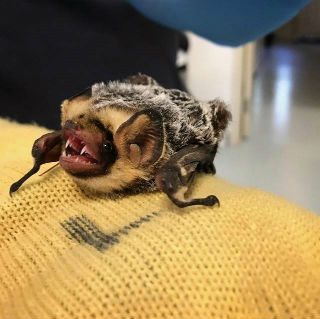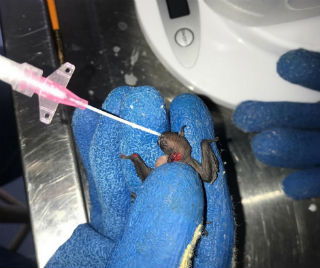The 7 most frequently asked questions about bats at our wildlife hospital
Sick, injured, and orphaned bats come to our wildlife hospital at all times of year. We have already cared for several this summer – adults, adolescents, and orphaned babies.
When people come to our wildlife hospital to visit, they ask some good questions about how we care for bats and the common injuries and ailments we see.
To help you learn more about wildlife, we pulled together the 7 most frequently asked questions and sat down with Dr. Rob Adamski, NEWC’s lead wildlife veterinarian to get his answers.
Check out the bat Q&A below!
What and how do you feed the bats at the hospital?
Dr. Adamski: We feed the bats a combination of canned kitten or puppy food which provides a balanced nutritional diet, as well as mealworms.
We initially have to handle them to “teach” them how to eat because our native bat species are insectivores that hunt on the wing or while flying. Assist feeding is not a natural process for them, but essential from a medical standpoint to provide them with calories and nutrition while they recover from their injuries and/or illnesses.
Do they stay inside at the hospital while they recover?
Dr. Adamski: Once we have resolved their medical problems or injuries, we transfer them to the Cape with a bat flight cage. We want them to get flight exercise to build up their flight endurance and ability, as well as practice hunting flying insects again. This process helps ensure they are ready for release back to the wild.
Do you vaccinate bats at the hospital for rabies?
Dr. Adamski: Because the vaccine has been tested in dogs, we can feel confident about using it in animals related to dogs – animals like raccoons, skunks, foxes, and coyotes. The vaccine has not been tested for use with bats, so we don’t vaccinate them.
How do you protect yourself from the risk of rabies?
Dr. Adamski: Our staff, interns, volunteers – anyone working in the hospital – is vaccinated against rabies. We also take sensible precautions when handling rabies vector species such as bats. We wear gloves and mask, and minimize direct handling whenever possible.
Do you test bats for rabies?
Dr. Adamski: Unfortunately, there is no way to test an animal for rabies while it is alive. The only approved method is to humanely euthanize the animal and test brain tissue.
So we only test a bat for rabies if there is pet or human exposure and/or the bat is showing abnormal neurological signs. The neurological signs might indicate it has been infected with the rabies virus.
Are pesticides bad for bats?
Dr. Adamski: Pesticides can potentially be hazardous to bats if they come in direct contact with the substances. Indiscriminate use of pesticides can also have several negative effects on other wildlife and the environment in general.
First, pesticides can kill the insect prey that bats and birds depend on as a food source. Second, pesticides not only kill harmful insect species such as mosquitoes, but also useful ones such as bees which pollinate many of the foods we eat.
Here is link from a reliable and useful insect conservation organization with further information regarding the significant environmental problem posed by pesticides: xerces.org/neonicotinoids-and-bees/
Do the bats squeak?
Dr. Adamski: Bats do use echolocation, which isn’t audible to people. They will vocalize sometimes and it sounds like a chitter noise.
Want to Learn More About Wildlife?
New England Wildlife Center is open to the public, 10 am – 4 pm, 7 days a week, all year long. You can look through the observation windows at our wildlife hospital to see animals receiving care. You can also learn about local habitats in our Weezie Nature Center and by walking along our outdoor nature trails.
And to get the latest updates on wildlife receiving care at NEWC and other educational information, follow us on Facebook or subscribe to our Wild Update email list.



